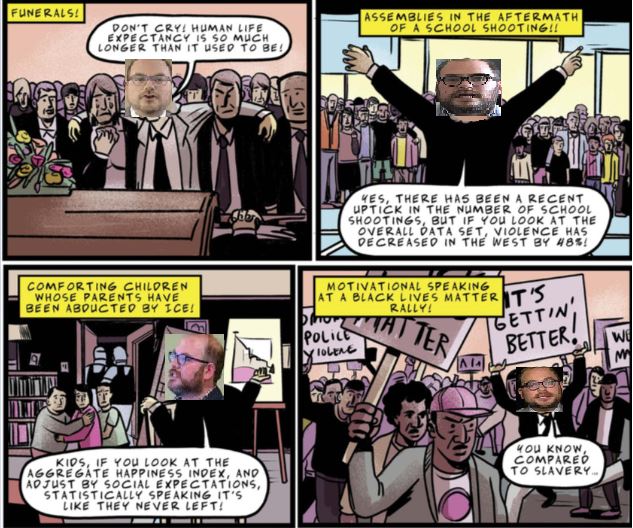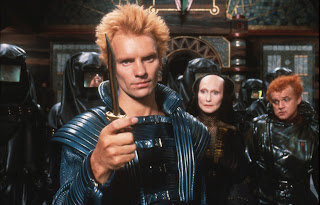Matt Yglesias is often at the forefront of discourse as it's put forward by pundits. He is somewhat respected as a liberal contrarian with opinions that - whether you agree with them or not - do represent a general consensus amongst other liberals in power. He's also an asshole.
I follow Yglesias on Twitter because his opinions can be used as a guidepost in semi-useful ways. When I was writing about the Defund the Police movement and Alex Vitale's book "The End of Policing", I used Matt Yglesias' defining article on the issue - in which he scorches the idea for its lack of popularity and political pragmatism - to frame a lot of my arguments.
It was truly shocking to see his tweet the other day, the day in which 18 **school children** were gunned down in Texas, which ultimately defended the United States as The Place to Be in spite of its problems. Even setting aside the fact that the message is so poorly timed it borders on evil, it's not hard to point out the myriad of ways this sentiment, though obviously not an uncommon one, is wrong.
Yglesias was likely seizing on the deluge of Tweets and commentary all extolling some version of "This Is America" or "this is a uniquely American Problem" or "This was entirely predictable here in America". He ultimately decided that everyone using this unimaginable tragedy to discuss the regularity of such tragedies in our country was illogical and it was important to set the record straight.
To Yglesias, the USA is a good country. Why? Two main reasons; some elusive measure of all of human history (life expectancy maybe?) and the fact that people around the world want to live here.
Both of these clauses make for a favorite rhetorical move for pundits in the Take Factory. Simply take a couple of objectively true statements like higher quality of life measurements or the fact that some immigrants want to live here and then extrapolate a premise that doesn't necessarily stem from the true statements: America is therefore good and we should avoid criticizing it as a bad place where uniquely bad things happen.
Yet even the apparently true statements Yglesias banners around have some problems. Consider the "all of human history" comment. This could very well be true, Modern America is certainly a better place to live than 14th century Spain by any metric. The question is why this is important to bring up. Measuring quality of life based on how someone might have lived in the past isn't useful because that person could never exist in the past. The true measure would be how many people are living the best possible life now, which means considering the lives of people relative to the lives of other people who exist.
Two great examples of this are mass shootings and the uninsured. It's preposterous to look at someone who is uninsured or the victim of a masshooting and tell them that if they existed in in another time period they would be more likely to be uninsured or killed. Imagine telling an uninsured person that insurance didn't even exist in the 1920s so they should be thankful it's at least a possibility! The real point to understand is that there are people all over he world that do not suffer these things because they do not have the problems that America has. You could take school children or working adults with identical conditions in America and put them in other countries and they would not suffer the same issues they suffer here.
So "anywhere in human history" is an irrelevant and unnecessary measuring stick. But to be fair, Yglesias also brings in the more relevant point when he says "all over the world". We're unsure what he's referring to as he doesn't mention any particular metric. He would be incorrect if he were referring to a whole host of things from gun violence, to paid maternity leave and the maternal mortality rate, to the rate of uninsured and outcomes in healthcare, to the number of incarcerated citizens etc etc where the US lags behind many, many other countries.
Yet people do clamor to move here! Of course no one cites our mass shooting or terrible healthcare outcomes as they reason why, generally they're moving here for "opportunity". This can mean different things for different people, opportunity for wealthy Northern/Western countries could be harder to pinpoint than countries in the so-called "global south" whose residents who want to move here are looking for a better life.
For the former, it's not likely our lack of free university education or dwindling public education institutions, it isn't likely our for-profit health financing industry, it's not our affordable housing, it's not our lack of violence and public safety. It's most likely because of their employment or because they married an American citizen spouse. Which there is of course nothing wrong with, but one would hardly call a country the best place to live because it has interesting places to work and Europeans find the love of their lives here.
The latter portion of people who want to live in the US are coming from countries that do not have the same material conditions or rights. Yet this seems a strange metric as well since someone's desire to move to a place with better material conditions or freedom should not logically matter when the best material conditions and rights aren't delivered. The US has treated people who want to come to this country - people from countries like Haiti or El Salvador - with flagrant abuse. Those that come here to work - legally or not - remain one of the most exploitated labor forces in the country. What's worse, many of the countries where people are fleeing totalitarianism or poor standards of living have those things because of an active or passive role the US played. Even countries like India or China where people come to work in tech on H1B visas for better pay still have to enter a beauracratic hellscape where being forced to uproot isn't uncommon.
Which is all to say that comparing a life in Modern America to a theoretical life in human history or another part of the world fails to imagine what that life would be like if the US didn't exhibit such a horrible set of unique problems. It's exactly because we can and should imagine an America in which children are not murdered in school that we critize the version we're currently living in where this is a terrifyingly common occurence.
In short, we should not be measuring someone's life around what that life would look like in the past or in another place on earth, but what that person's life should look like if the society they were in treated them with dignity.
When I heard about this mass shooting in a school hundreds and hundreds of miles away I clutched my daughter close and listened to her heartbeat in a state of pure despair. Amazingly, Matt Yglesias telling telling me Modern America was better than any time period or place I could theoretically exist offered no comfort.











